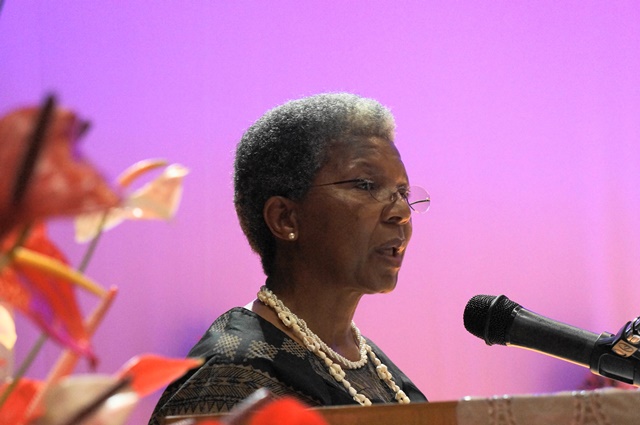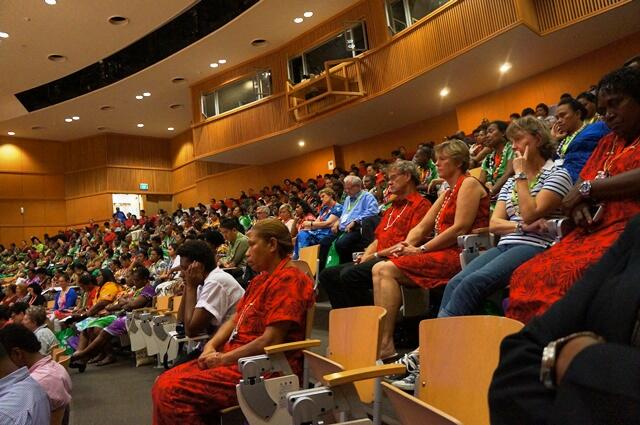THIS week, about 400 professionals in the area of sexual and reproductive health are in Suva for the 11th Pacific Society for Reproductive Health Conference which, in its various activities that include panel discussions and clinical hands-on sessions, hopes to inculcate knowledge and practice that will enhance partnerships for increased investment in the ultimate goal of improved results.
The United Nations Population Fund (UNFPA) Pacific Sub-Regional Office which has always been supportive of the society is humbled to have been of some assistance to this year's conference and the organisation's commitment to continued support was reaffirmed to participants during the official opening on Tuesday afternoon.
"We at UNFPA are very pleased to have been able to support this conference," UNFPA Pacific reproductive health adviser Dr Pulane Tlebere told participants.
"We would like to reaffirm our commitment to continue to combine our resources and strengths to work together with our partners and stakeholders in promoting gender equality and to support the Pacific Island countries (PICs) in their efforts to realise universal access to sexual and reproductive health services for their populations."
The conference proper was officially opened by the President of the Republic of Fiji, Ratu Epeli Nailatikau, who is an advocate for behaviour change in people's attitude and practice in HIV and AIDS. Ratu Epeli underlined the fundamental area the learning and networking at this conference would ultimately improve, women's health.
The conference effectively brings together nurses, midwives, obstetricians and gynaecologists from around the Pacific including participants from Papua New Guinea, Australia and New Zealand.
Participants have been involved in practical workshops from last weekend in the area of family planning, emergencies in obstetrics, neonatology, ultrasound avoiding surgical complications and research. The conference is organised by a local organising committee and a scientific committee.
"Together you can look after all those who depend on you for health care," Ratu Epeli told the packed Japan ICT Centre at the University of the South Pacific.
"I am glad to know that you are tackling important areas or promoting family life - the integrity of the family is vital - this subject must be pursued with vigour."
Not new at all in the arena of sexual and reproductive health and rights (SRHR), Ratu Epeli in an address in October 2013 had also emphasised women's health stating that albeit Fiji's status as a developing country, "when it comes to the health of women and children every individual counts no matter where they may live or what their standing is.
"Women are vital to nation-building. None of us would be here today if it was not for our mothers. The future mothers of our country are the young girls and women who are attending our schools and tertiary institutions. Their reproductive health is of great importance."
This week's conference which discussed current issues and evidence-based practices which are essential for the improvement of maternal, neonatal, adolescent and child health outcomes as well as promotion of child survival is a critical one considering that we have less than 180 days before the deadline for the achievement of the Millennium Development Goals (MDGs).
Dr Tlebere told participants that while good progress had been made with MDG 5A (Improve Maternal Health) by a number of countries in the Pacific region, meeting the MDG 5B goal of "achieving universal access to reproductive health" had however been particularly challenging.
"Contraceptive prevalence rate known to directly affect maternal deaths, has seen little progress or reversal in achievements, in addition, unmet need for family planning remains high in the Pacific and is even higher among adolescent girls and young women," Dr Tlebere reminded participants on Tuesday.
"Most countries in our region will therefore enter the post-2015 era with unfinished business which will require efforts to be intensified as new goals and targets are set."
Last year, 2014, was a landmark for the 20-year International Conference on Population and Development (ICPD) Program of Action (PoA), the global framework which guides the work of the UNFPA. The end of the 20-year period was therefore a time of reflection part of which was a global review of how exactly had the PoA faired.
"I would therefore like to commend the organising committee on the choice of the theme for this conference 'Reproductive Health in the Pacific beyond 2015' as we indeed have to start looking at how to address the unfinished business of 2015 through the new Sustainable Development Goals (SDGs)," Dr Tlebere said.
"In order to ensure that every man, woman and child in the Pacific Island countries has a life of health, dignity and equal opportunity; advancements are needed in reproductive health through education, health care systems and services, national policies and resource allocation.
"All this combined with strong government ownership and strong partnerships with the UN, international, regional and local communities will save lives. This meeting provides a good opportunity for us all to learn from each other and address the challenges of human resources, strengthen advocacy efforts to translate political will to tangible actions, innovative approaches and strategies that will lead to closing the equity gaps in access to care and others."
As we await the outcome of the conference, it is UNFPA Pacific's hope that participants will return energised for intensified effort for more effective implementation, and ensure evidence-based interventions are followed and the coverage and quality of services are continually enhanced.
We owe it to ourselves, but more so to the future peoples of this ocean of island nations, to care and act.



